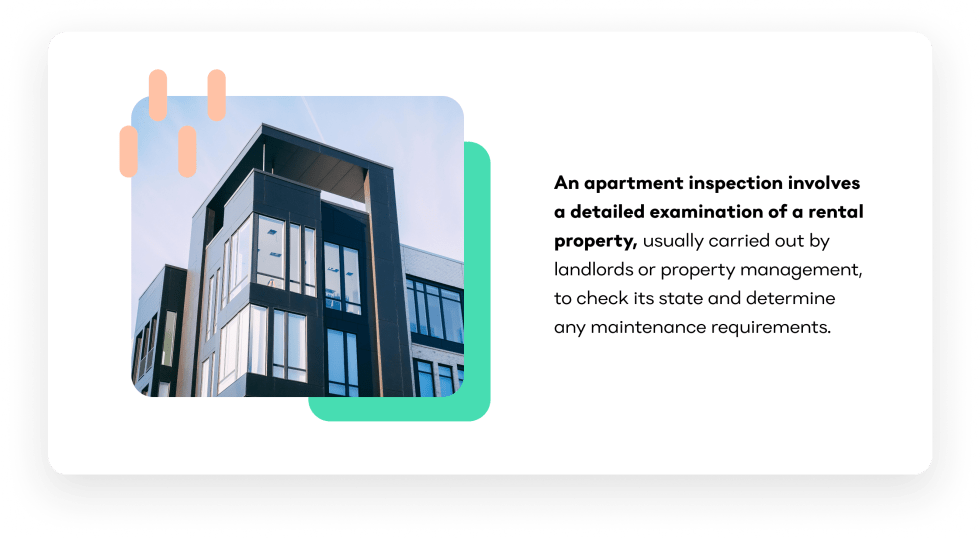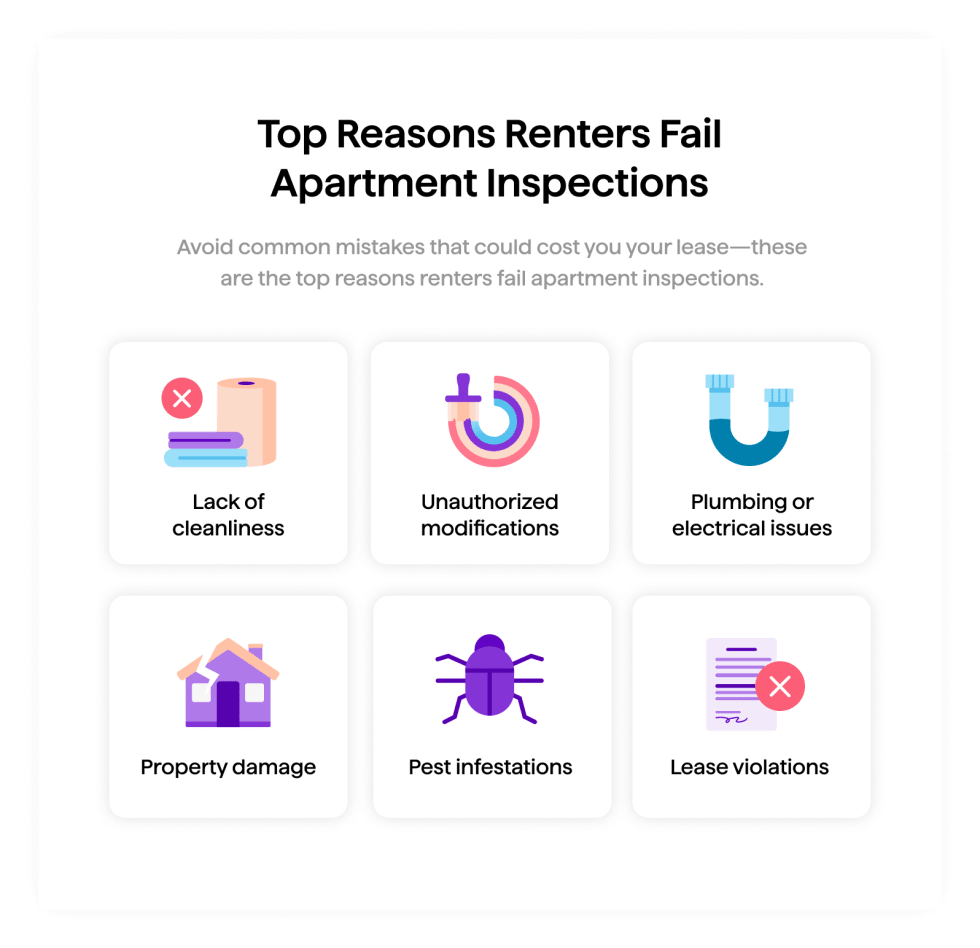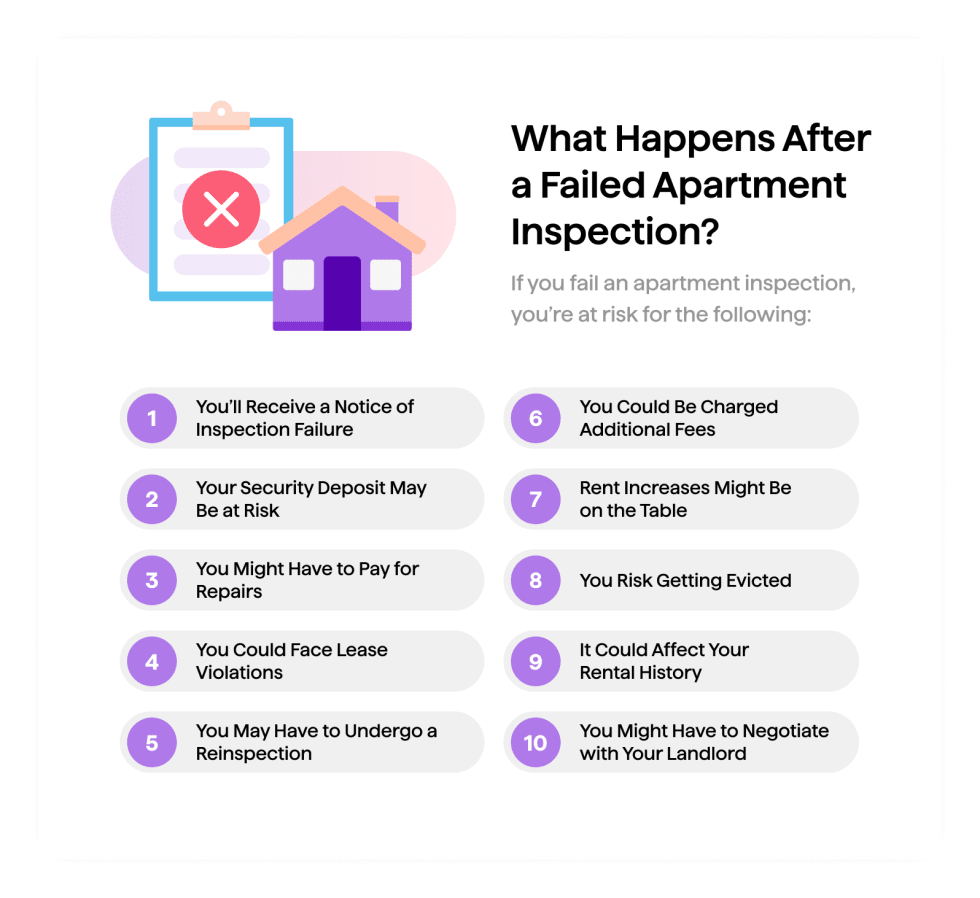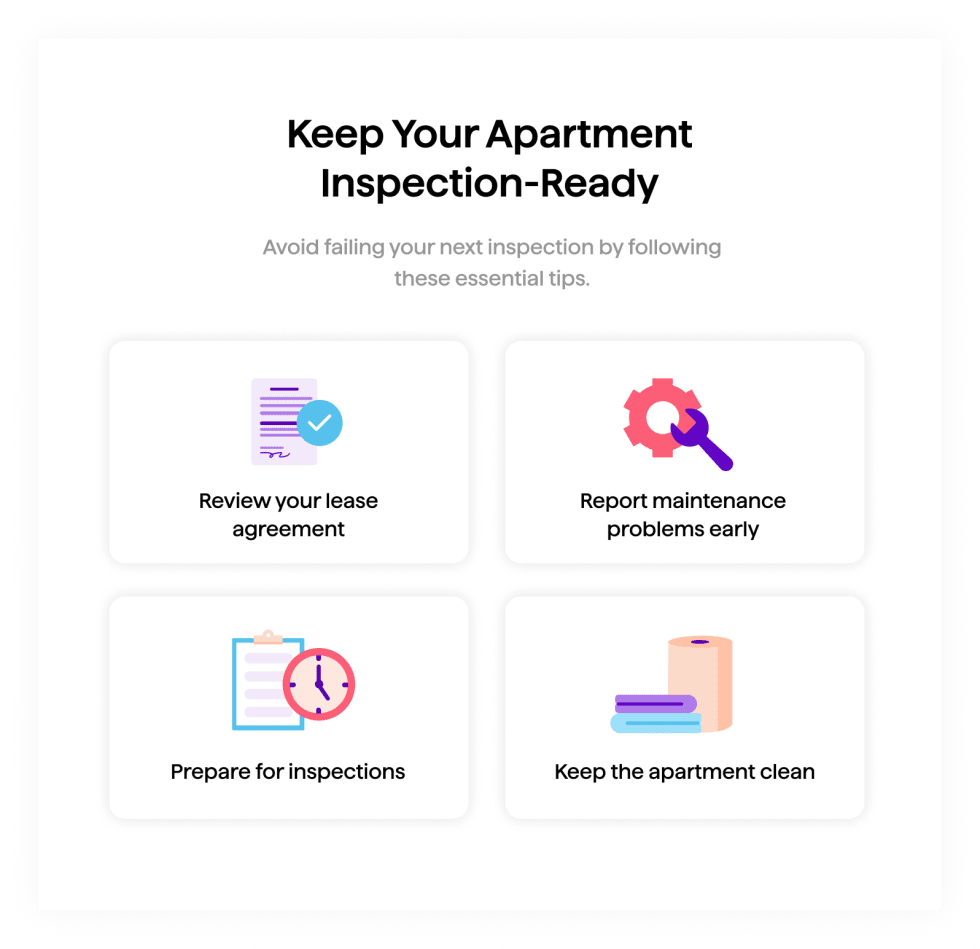- 97 units available
- 1 bed • 2 bed
- Amenities
In unit laundry, Granite counters, Hardwood floors, Dishwasher, Pet friendly, 24hr maintenance + more

If you fail an apartment inspection, you’ll usually get a written notice listing the issues and a deadline to fix them. In most cases, you’ll have the chance to make repairs, schedule a reinspection, and protect your rental history. But depending on the severity, you could also risk losing part of your security deposit, paying repair costs, or facing lease violations.
Apartment inspections can feel stressful—especially when you’re not sure what a landlord is looking for. Maybe you forgot to report that leaky faucet and now there’s water damage. Maybe your pet got a little too enthusiastic with the baseboards. Or maybe you’re just wondering how long apartment inspections take and what happens if you don’t pass.
Here’s the good news: failing an inspection isn’t the end of the world. Most issues can be fixed if you know what landlords look for and how to prepare. Let’s break it down.
An apartment inspection is when your landlord, property manager, or a hired inspector checks the condition of your unit. Inspections usually take 24–48 hours to complete and can happen:
The main goal? To make sure your apartment is safe, livable, meets local housing laws or insurance policy guidelines, and is in line with your lease agreement.

Wondering what can a landlord look at during an inspection? Think of it as a walkthrough with an apartment inspection checklist in hand. Common checkpoints include:
| Inspection Area | What the Landlord Looks For |
|---|---|
| Walls & Floor | Holes, scratches, stains, or other visible damage |
| Appliances | Stove, fridge, dishwasher, microwave all working properly |
| Plumbing | Leaks, clogged drains, water damage |
| Electrical Systems | Outlets, light fixtures, smoke detectors |
| Cleanliness | Apartment is livable and reasonably clean |
| Pest Issues | Signs of roaches, rodents, or infestations |
| Smart Home Devices | Locks, thermostats, or other connected devices working and untampered (if included in lease) |
| Lease Violations | Unauthorized pets, extra roommates, indoor smoking |
You can always ask your landlord if they have a copy of their apartment inspection checklist—so you know exactly what to expect.
If you’re stressing about what inspectors look for, here are the top 10 reasons renters don’t pass:
Failing for one of these reasons doesn’t necessarily mean eviction—but it can mean a “pass with conditions” apartment status, where you’ll need to make repairs before you’re fully cleared.

A landlord cannot invade your privacy or use inspections as harassment. That means they can’t go through your personal belongings, force their way into locked spaces, or show up without proper notice (usually 24–48 hours in writing).
Here’s a quick breakdown of what landlords are not allowed to do during inspections:
Bottom line: inspections are meant to keep apartments safe—not to cross boundaries. If your landlord steps out of line, you have options to protect your rights.
If you’re wondering what happens if you fail an apartment inspection, take a deep breath. Failing doesn’t mean instant eviction—but it does come with consequences. Here’s what to expect and how to bounce back.
If your unit doesn’t meet the standards in your lease or local housing codes, you’ll get a formal notice spelling out the problems. This notice usually includes:
Keep this notice—it’s an official record, and you’ll need it for documentation.
Special case: If you fail a Section 8 inspection checklist, the Housing Assistance Payment (HAP) can be withheld from your landlord until repairs are made. You’ll still need to pay your portion of rent, so it’s important to address issues quickly.
After failing an inspection, you may wonder, “Is a security deposit refundable?” If the violations are serious enough—like excessive damage, unauthorized changes to the apartment, or significant cleanliness problems—you could lose part or all of your deposit.
| Situation | What Happens to Your Deposit |
|---|---|
| Normal wear & tear | Fully refundable |
| Minor damages (ex. wall scuffs, dirty oven) | Small deduction for cleaning/repairs |
| Major damages (ex. broken appliances, pet damage, holes in walls) | Partial or full loss of deposit |
| Significant violations or failure to repair | Deposit may not cover full costs; you may owe more |
To avoid losing your security deposit, keep thorough documentation of the apartment’s condition when you move in. This will help protect you from unnecessary fees.
If the issues found during the inspection go beyond normal wear and tear, you’ll probably be responsible for covering the costs. For example, you’ll need to pay to repair an appliance you obviously damaged or replace a carpet your pets damaged.
Landlords may require you to hire a professional for major repairs. But if you’re handy, you might be able to handle some minor fixes on your own.
Ignoring repair requests can escalate consequences. Not only could you incur additional penalties, but repeated negligence could impact lease renewal, lead to fines, or even trigger eviction proceedings in extreme cases. Promptly addressing repairs demonstrates good faith and helps maintain a positive relationship with your landlord.
If your apartment fails an apartment inspection due to a lease violation—like an unauthorized pet, your significant other moving in without being on the lease, or smoking indoors—you could be in breach of your lease agreement.
The upside? Many landlords allow you to correct the problem and stay in the apartment. The downside? Repeat violations can lead to steep fines—or even lease termination.
Fail once, fix the issues, then get reinspected. That’s the usual process. The failure notice will often include a reinspection date.
Pro tip: Do your own final walkthrough before the re-inspection to make sure everything’s resolved.
Some landlords charge reinspection fees if multiple inspections are necessary to verify that problems are corrected. In some cases, fees may be waived if the tenant resolves the issues before the scheduled reinspection, providing an incentive to act quickly.
Beyond reinspection fees, tenants may face fines for specific lease violations. For example, unauthorized pets or smoking indoors could result in charges, even if the unit eventually passes the reinspection. The faster you resolve issues, the less likely you’ll face extra charges.
If you consistently fail inspections, your landlord may raise your rent or refuse to renew your lease at all. Landlords will usually justify increases based on additional maintenance costs due to the lease violations.
Keeping your apartment in good condition can help you stay on good terms with property management and avoid rent raises. Depending on what city you live in, rent control laws may limit how much landlords can raise rent due to damages.
Are you worried about how to rent with an eviction on your record? In extreme cases, failing an inspection can put you at risk of eviction, especially if the issues pose a health or safety hazard. Here’s what to know:
If you’re worried about the inspection, consider having an open conversation with your landlord about resolving the issues as quickly as possible.
Many landlords check people’s rental history before approving new tenants. If you fail inspections multiple times, especially for serious reasons, it could be reported, making it harder for you to rent in the future.
Many property management companies share rental records, and a bad rental history could lead to higher security deposits at future rentals. Keep in mind that references from past landlords matter when applying for a new place.
If you fail an inspection, be sure to maintain clear communication with your landlord. Some landlords are willing to work with residents to resolve issues without penalties, especially if you’ve been a good renter in the past.
Ask for a specific extension if you need more time for repairs. It’s always best to be honest and proactive about fixing any problems.

Here’s a quick remediation checklist if you fail an apartment inspection:
Following these steps reduces the risk of extra fees or penalties—and keeps your rental record clean.
Even after a failed inspection, tenants retain important rights:
Knowing your rights ensures your landlord can’t impose arbitrary penalties—or use inspections as harassment.
The best way to avoid the stress of failing an apartment inspection is to stay on top of maintenance and cleanliness. Here’s what you can do:
| Renter To-Do | Why It Helps |
|---|---|
| Clean regularly | Prevents surprise violations |
| Report maintenance issues early | Stops small problems from becoming big ones |
| Review lease rules | Avoids violations (i.e. pets, roommates, smoking) |
| Do a self-inspection | Catch problems before your landlord does |
| Document everything | Protects your deposit and rental history |
By staying ahead of maintenance and cleanliness, you reduce the risk of violations and potential fees while building a positive relationship with your landlord.

Whether you failed an apartment inspection and need a new place—or you’re just ready for an upgrade—Apartment List can help. We’ll match you with apartments that actually fit your needs (and your budget). Start browsing our apartments today, or take our quick quiz to narrow your search. With Apartment List, you’ll spend five minutes and save 50 hours searching.
Yes, but only if the issues are serious (like severe damage, unauthorized tenants, or illegal activity). In most cases, you’ll get a chance to fix problems before eviction is on the table.
It depends on your lease and local laws. Landlords usually give you a written notice with a deadline, ranging from a few days to a few weeks. Miss the deadline, and you could face fees or even legal action.
If you believe the inspection failure was unfair, review your lease agreement and any provided inspection reports. You can request a written explanation from your landlord, provide evidence (such as photos from move-in), and attempt to negotiate. If necessary, you can file a complaint with local housing authorities or seek legal assistance.
Yes. If it escalates to eviction or legal disputes, it may appear on tenant screening reports. Keep your unit in good shape and resolve disputes quickly to protect your rental record.
Not always. Some may just deduct repair costs from your deposit. If a reinspection is required, it will be listed in your failure notice.
Refusing can violate your lease and lead to fines, termination, or legal action. Landlords have the right to inspect with proper notice. If you’re uncomfortable, talk with your landlord to find a reasonable solution.
Start by gathering evidence, such as photos or maintenance records, to prove your case. Request a detailed report from your landlord explaining why you failed. If you believe the decision is unfair, try negotiating or requesting a re-inspection. As a last resort, you can escalate the issue to local tenant advocacy groups or housing authorities.
Not necessarily. If you fix the issues in time, your deposit should be safe. But if there’s damage beyond normal wear and tear—or unauthorized changes—expect deductions.
Not always, but many do. Some states or cities require landlords to provide a pre-inspection checklist, especially before move-out inspections. If you’re not sure what will be checked, ask your landlord for a list or refer to your lease agreement.
Regular apartment inspections are done during a lease agreement to make sure the unit is well maintained—upon moving out and sometimes on the spur of the moment. Move-out inspections focus more on damage and cleaning costs that could impact your security deposit.
Your rights depend on your lease and local tenant laws. In most cases, you have the right to:
Minor issues usually won’t stop a renewal. But repeated violations, unpaid repair costs, or major damage could lead to non-renewal—or eviction.


In unit laundry, Granite counters, Hardwood floors, Dishwasher, Pet friendly, 24hr maintenance + more
In unit laundry, Hardwood floors, Dishwasher, 24hr maintenance, Stainless steel, Walk in closets + more